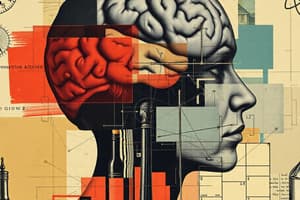Podcast
Questions and Answers
What was Wilhelm Wundt's contribution to the scientific study of psychology?
What was Wilhelm Wundt's contribution to the scientific study of psychology?
Founded the first psychological laboratory in Leipzig, Germany in 1879, dedicated to the scientific study of immediate conscious experience of sensation using careful methodology and introspection.
What was the focus of the School of Structuralism in psychology?
What was the focus of the School of Structuralism in psychology?
The structure of the mind and identification of the basic elements of consciousness (sensations, feelings, and images) using trained introspection.
What was Edward Titchener's contribution to psychology?
What was Edward Titchener's contribution to psychology?
Analyzed consciousness into its basic elements and investigated how elements were related (structuralism) using introspection.
What was G. Stanley Hall's contribution to psychology?
What was G. Stanley Hall's contribution to psychology?
What was William James' criticism of the structuralists?
What was William James' criticism of the structuralists?
What was Wilhelm Wundt's requirement for the validation of experimental results?
What was Wilhelm Wundt's requirement for the validation of experimental results?
What was the primary focus of the structuralist approach in psychology, and what method did they use to study the mind?
What was the primary focus of the structuralist approach in psychology, and what method did they use to study the mind?
Who is credited with establishing the school of psychoanalysis, and what did he believe influenced behavior?
Who is credited with establishing the school of psychoanalysis, and what did he believe influenced behavior?
What was the focus of Ivan Pavlov's research, and what did it lead to?
What was the focus of Ivan Pavlov's research, and what did it lead to?
Who established the psychological school of behaviorism, and what was its focus?
Who established the psychological school of behaviorism, and what was its focus?
What was the focus of B.F. Skinner's research, and what methods did he use?
What was the focus of B.F. Skinner's research, and what methods did he use?
Who were the leaders of the humanistic approach in psychology, and what did they focus on?
Who were the leaders of the humanistic approach in psychology, and what did they focus on?
What is the primary feature of a good scientific theory?
What is the primary feature of a good scientific theory?
What is the purpose of peer review in the scientific process?
What is the purpose of peer review in the scientific process?
What is the difference between a theory and a hypothesis?
What is the difference between a theory and a hypothesis?
How can our theories influence our observations?
How can our theories influence our observations?
What is an example of a cognitive bias that can affect scientific research?
What is an example of a cognitive bias that can affect scientific research?
What is the significance of testing hypotheses in scientific research?
What is the significance of testing hypotheses in scientific research?
Flashcards are hidden until you start studying





